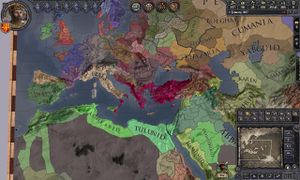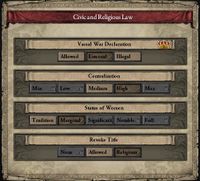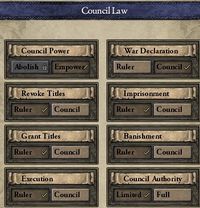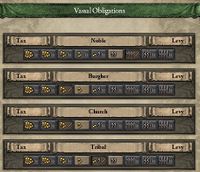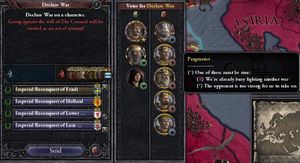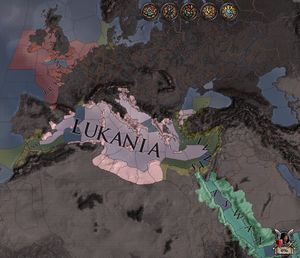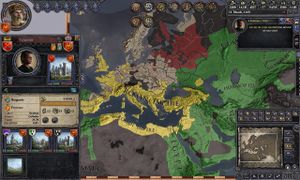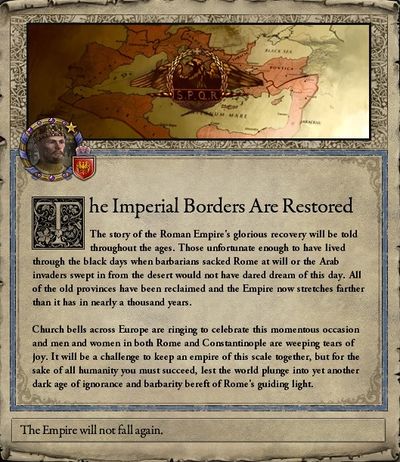| 指南:如何重建罗马帝国 | |
|---|---|
地图
|
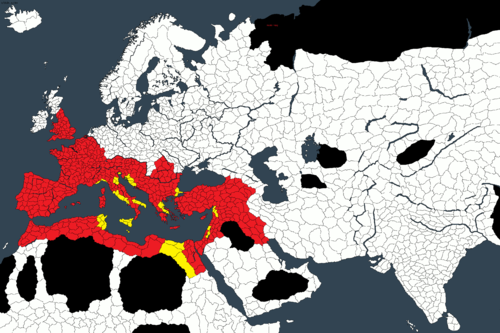
|
家族
|
Isauros/Makedon |
国家
|
Byzantine Empire |
开局日期
|
Jan 1, 769 / Jan 1, 867 |
This guide was originally published on Paradox forums under the title Sic Itur ad Astra, an extended SPQR guide and has been adapted for the wiki.
Consilium - Defining a Strategy
This guide describes how to get the S.P.Q.R. achievement with Defensive Pacts on, and gives detailed descriptions of the intermediate and advanced game concepts your success relies on. It does not try to give the fastest way to get SPQR, otherwise we wouldn't be using Defensive Pacts at all. The point is to show how to deal with the challenges posed by Defensive Pacts in an on-the-rails, no gimmick playthrough (this also means no vassal pope). It can also be used for the more limited Pentarch/Legacy of Rome playthrough, and many of the notions apply to any world conquest or super-empire runs.
Game settings
The game was done in patch 2.6 with the following DLCs: Conclave, Legacy of Rome, Sword of Islam and The Old Gods. Defensive Pacts and Shattered Retreat are on, Women Status laws are available. My first try from the 1066 start failed because my last-ditch effort to annex the HRE was thwarted by its dukes, who managed to turn the empire Elective when faced with the prospect of my son inheriting it. I would have been mad if this hadn't been a brilliant move from the AI's perspective.
I decided my second attempt would be a Catholic run. We are not going to Mend the Schism. I took that decision because, in the late game, Defensive Pacts essentially limit you to one war per decade, forcing you to grab as much land as possible in a single war. Crusades are pretty much the only way to conquer an entire kingdom from the Muslims.
The best start date is arguably 867. The Byzantine begin the game in a good position, they are the first military world power and led by the capable Basil I. The Abbasid are your most powerful enemy, but they are not strong enough to cause serious damage unless they catch you in a civil war. The other large realm is the Umayyad, but they are on the other side of the Mediterranean and someone else's problem. The rest of the world is more fragmented than at any other start, which is for the best since it means less coordination inside the Defensive Pacts.
Initial goals
The immediate threat is a large Muslim force besieging Syracusae. Historically, the city fell, but these enemies are comparatively much weaker than the 1066 Seljuk invasion. Mobilize quickly and destroy them. With the infidels out of the way, let's refine our strategy. We want to use Crusades, which can be activated by the following triggers:
- Fall of Rome: Rome is held by non-Christian or heretics. Very unlikely.
- Byzantium, France or Germany Threatened: One of several critical duchies controled by non-Christian. The one that could realistically fall is Toulouse, should the Umayyad push into France, but you can't rely on it.
- Reclaiming the Holy Land: Year is past 1090 and Jerusalem not held by Christian.
That's it. If you claim Jerusalem before 1090, your only way to start the Crusades is to take Rome, convert to a Catholic heresy and switch back. While doable, it qualifies as gaming the rules and will not be considered. So we will Restore the Roman Empire around 1100. This is much later than your typical playthrough but it doesn't really matter, you have enough Holy War targets to remain busy until then.
Restoring the Empire requires the following duchies : Thrace and Athens (already owned), Antioch (Syria), Alexandria (Egypt), Croatia (Croatia), Tunis (Africa), Jerusalem (Jerusalem) plus 7 duchies in modern Italy. This gives the general direction of our game : expand in Italy and Eastern Mediterranean until the Pope is ready to claim the Holy Land, then Restore the Empire and start the northern expansion.
Invasion with bloodline ( Holy Fury DLC)
Holy Fury DLC)
You can spend an insane amount of gold to get the Immortal blood of Alexander, prepare at least to spend 10000 gold coins.
Each of the rulers with the bloodline, the Emperor and all the family members with titles and the bloodline will get the Invasion casus belli once in their life. This fabricated bloodline allows the invasion of a whole Empire at once making the achievement easier but still slowed by the Defensive pacts.
Strategy: pick the largest kingdom within the realm of the target Empire (like Andalusia in Hispania), reach 100% to secure victory then occupy all the counties out of the selected target kingdom. You only need to hold the main county, not all the baronnies.
Also, you can use commit suicide or death on the battlefield so you can get a new invasion casus belli with your heir.
The main drawback is you may not be able to usurp kingdom titles so you will get many extra vassals and be over the limit quickly.
Inter Arma Enim Silent Leges - Getting Started
在武器之下,法律就会沉默
在没有秘密会议的情况下,我无法给出任何关于皇权的建议。有了秘密会议,你有不少改革要通过。我们的第一个战略目标是称霸意大利,同时让帝国为几个世纪的战争做准备。
The Conquest Begins
一旦有1k左右的本金,便应立即开始扩张;这是一种应急措施,以防你遇到意外的内战而需要雇佣兵。把穆斯林赶出西西里(一场圣战就够了),然后一路向北。一个好习惯是把任何新的公国头衔都给你的家族成员,他们有好感加成,担任议员时更容易感到满足。只是不要把任何好的土地给那些觊觎你头衔的人和你的年幼儿子。
在意大利南部和塞尔维亚扩张很简单,因为你们在那里有法理上的主权要求。开始捏造对威尼斯、拉丁姆和克罗地亚公国的宣称。一旦你拥有了这些公国的大部分,就篡夺它们,你就可以对其他县提出法律上的要求。如果对威尼斯的征服摧毁了商人共和国,那么重建商人共和国可以提供很高的贡金。如果你打算把罗马作为首都,那么当你征服它的时候,一定要做好上述步骤。一旦帝国恢复,游戏会建议你这么做,但这不会发生在1100s之前;君士坦丁堡在科技上将遥遥领先,改变它已是不切实际。无论如何都要把君士坦丁堡占为己有,它是游戏中为数不多的7孔地。
当紫色慢慢爬上亚得里亚海的时候,你的第一个真正考验不是军事上的,而是政治上的——你能把意大利王国纳入帝国吗?
- 一郡一郡地做,需要的时间太长,不可行。
- 最好的情况是,一个有强宣称的王子愿意加入你的宫廷。在这种情况下,邀请他并与之一个县(必要时从你自己的县中),然后立即提出他的宣称。由于头衔宣称者在你的国内领有土地,他就是你的附庸,即使他成为国王,也会一直是你的附庸。
- More realistically, you will find a weak claimant or marry an Italian princess to get yours. In that case, watch the weak claim button and wait for the opportunity to claim the kingdom. Land the claimant as above.
- Should the heir to Italy happen to be a girl, secure a betrothal to your heir. You grandson will inherit both the Empire and the kingdom of Italy, resulting in a rare non-violent conquest.
- If Italy is elective, get the duchies of Latium and Genoa. Give the Genoa duchy to your claimant, which makes him eligible, and use your Latium title to vote for him. He will also vote for himself, and two votes should be enough to make him third in line and press a weak claim.
More details when we reach France in paragraph 4.
Once Italy is yours, and you have claimed every stray holding in the Boot, you can make your triumphant entrance in the Eternal City :
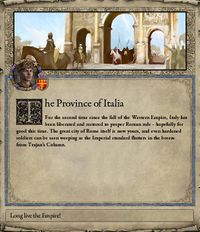
Early game laws
With this author's style, your law tabs should by this point look something like this:
We want vassals to expand the kingdom whenever they can. Whether they grab stray holdings or mop up the remnants of a Muslim empire, they will not face Defensive Pacts, and a conquest you didn't personnaly participate in only adds a negligible amount of threat. This can save decades in a game where time is a concern.
External vs Allowed is debatable. Imperial administration already gives you the power to revoke Duchy titles and retract vassal of vassals, and External is -5 vassal opinion. Still, I find External to be worth it if vassals focus their energy on outside expansion, saving you more Threat.
With Imperial administration in place and your Empire about to dramatically expand, Absolute Rule cannot compete with the stability provided by War Declaration Commitee. Let the nobles pretend they have a say, and they won't do anything stupid when a battle goes wrong.
The most important part here is the two levels of Levy Focused Noble Obligation. This severely reduces your income but notably increases your forces. I find this worth it because vassal contributions will soon dwarf whatever your own demesne can produce, so upgrading it is not as important as at duke or king level. Burgher and Church taxes are shifted in the opposite direction to provide a bit more income, but it only becomes relevant once you establish merchant republics.
Patriarchae Orientales – The Roman Restoration
The Patriarchs of the East
You may have run into defensive pacts when expanding in Italy, this is the part where the game starts revolving around them
Threat and Defensive Pacts
I love Defensive Pacts. Without them, the late game is an endless series of curb-stomp on weak realms that stand no chance against your retinues alone. With them, you have to stop and actually plan your actions, while still enjoying more security from your world-power status. This is particularly true in SPQR, and it is very important to understand how they work.
As their name suggest, Defensive Pacts are a treaty where members of a certain religious groups agree to help each other in case one of them gets attacked by a specific enemy. Who will join these alliances depends on your Threat level, their number of troops and their distance to your nearest border. Each county you conquer adds an amount of Threat, proportional to the total number of counties in your realm. The amount is halved when pressing a claim for someone else or using a De Jure claim. A single county cannot add more than 15% and any event cannot add more than 50%. At 50% Threat, all Defensive Pacts except the one of your own religion essentially become one. At 75%, all Defensive Pacts will fight you. You may defeat a Muslim/Pagan alliance, you will not defeat Muslim and Pagan and Christian all together. Therefore, the magic number is 75%, declare a war whenever your Threat is lower than that.
Threat caps at 100% and decreases at the rate of 0.21% per month: returning from 100% to 75% takes 10 years. What can you do in the meantime? Not much that directly contributes to the restoration. There are only two ways to bypass this limit: granting independence to territories you don’t need (Scotland, Crimea, anything north of the Danube...) and attacking revolts (rebels are never accepted in a Defensive Pact). If you don’t have anything to do, increase speed and do whatever will keep you busy. Prompt factions to revolt now rather than in the middle of the next war, clean up internal bordergore, invite claimants to your court (see paragraph 4), This is the least attractive part of the playthrough, and the only reason I can think of to allow achievements with Pacts off.
On the other hand, this is a part where a player's skill will show: check how much Threat a county will add, and attack realms in an order that will bring you either lower than 100% threat, or far above it. Declare a war when you are at 74%, and find a way to declare a second one before accepting the first surrender (threat only increases when the war formally ends). Do whatever you can to either minimize the downtime, or maximize the amount of Threat that will “overflow” above 100%.
Marching East
With Italy secure, or about to be, you can turn your attention to the Muslim East. The 900s are a favorable time for expansion: fort levels are low and garrison rarely number above 1500, most holdings can be Assaulted with 10k men or so. Antioch lies at your eastern border, Tunis is within striking distance from Sicily.
In the Middle East, the Abbasid have no real target for holy wars and should quickly collapse from decadence. The successor emirates will grow stronger over time and are close enough to assist each other effectively in battle. To the south, the Tulunids will overwhelm the Coptic Christians and become the strongest Muslim realm on your side of Mare Nostrum. Their Sultanate of Egypt is a juicy target; Alexandria is needed to Restore the Empire, Cairo is a 7-holdings county you can put into your demesne, and the duchy of Aswan can be used to establish trade posts in the Red Sea. Note however that conquering Cairo will unlock Jihads. The other Muslims in North Africa pose comparatively little threat.
The plan is to control most of Egypt, Syria and Armenia Minor, plus Tunis, by the time of the First Crusade. You can go to Africa as well, though the Pope might eventually call a Crusade for it. Expect the fighting to be fierce. The Muslims are deceptively strong in the Skirmish and Pursuit phase, so don’t take unnecessary risks. All Muslims in the pact will instantly assist your target, and the Pagans will also try and siege some of your northern holdings. I recommend going for the largest realm first, multiple weaker enemy are easier to deal with because they tend to attack separately rather than making doomstacks.
Warscore goes from -100% to +100% and is calculated as follows:
- 75% for the destruction of the (initial) army. Allies are included in the calculation, so don’t expect to gain much on that front
- 5 to 10% per holding, but only for holdings owned by your main target (occupying holdings of other Pact members doesn’t do anything). If the realm is small, occupying a holding will add a much warscore, so that occupying every holding gives a total of 125%
- Whoever controls all holdings in target area gets a bonus that depends on the duration of the war. This ticking warscore does not reset if the target area becomes contested again
- Capturing family members of the primary contributor gives a bonus of up to 50% for a son and 100% for the ruler himself.
Most enemies will surrender above 95%, especially when you are not contesting their primary title Your levies will be spread all over the Mediterranean, but the Byzantine have so many fleets that transporting them to the front is not much of a problem. There are three main strategies against Defensive Pacts:
- Blitz: the defending realm is one or two county large and can be Assaulted into submission. Bring your retinues and the Varangian Guard to the border, declare war, spam Assault. Blitz targets should be saved for when your Threat is at 100%, since they will be completely occupied before the Pacts can do anything.
- Interior lines: the target is too large for a Blitz, but isolated enough that your besieging armies will be more or less undisturbed. You need 20k or 30k men in the target territory, while the bulk of your forces fights enemy stacks or plays whack-a-mole with smaller groups.
- Full-scale war: the same armies will have to siege and fight. Typical in the Middle East and France, this is the situation where the target and the Defensive Pacts are on the same side of your realm. It's the most difficult type of war: winter supply will be an issue, you may have to interrupt sieges to assist neighboring armies, and you might need to defeat everything the Pact throws at you before you can occupy enough holding to finally reach 100%. This also means you have to raise levies for a long time, potentially causing unrest.
Jihads will unlock in year 1000 if you control Tunis or in the 900s if you take Jerusalem or Cairo. They are about as bad as the Muslim/Pagan Defensive Pacts, so if you could conquer these territories, you can probably defend them.
If you are aiming for a standard Restoration/Mend the Schism playthrough, this is where we part. Make a holy war for Jerusalem, Restore the Empire, profit - and bonus points for doing it with Defensive Pacts on. If you are reaching for the stars, you can convert to Catholicism at any point. Different DLCs may open different options, with Conclave, I sent my son to be educated by a Catholic priest and picked the Faith focus, which converted the child in a couple of years. Once a Catholic ruler takes the Purple, all vassals who like you will switch and send their Court Chaplains to convert their provinces.
Crusades will unlock in the late 1090s and will be launched soon after. Join and crush the current owner the Holy Land, which should be largely surrounded by your own provinces. The point of taking Jerusalem only now is that you will get several Muslim duchies at once – up to 4, if the Kingdom was unified. This can save 20 or 30 years of holy wars and waiting. The Second Crusade, which normally targets Andalusia, will be even larger.
You can now Restore the Empire.
Roma Invicta - The Imperial Reconquest
Unconquered Rome
Tunis, Genoa, Antioch and Alexandria mark the borders of the Eastern Roman Empire at his greatest expansion - under Emperor Justinian in the 6th century. We enter the second half of the game with Byzantium as strong as it ever was in real History.
Restoring the Roman Empire is mostly notable for the cosmetic changes and the ![]() trait (+10 vassal opinion). You also gain the Imperial Reconquest Casus Belli, which can be used against any Christian ruler. I didn’t use it much, because it only targets one duchy at a time and is woefully inefficient for taking over large kingdoms. By now your threat jumps to 100% every time you conquer more than a single county, so better swallow kingdoms whole.
trait (+10 vassal opinion). You also gain the Imperial Reconquest Casus Belli, which can be used against any Christian ruler. I didn’t use it much, because it only targets one duchy at a time and is woefully inefficient for taking over large kingdoms. By now your threat jumps to 100% every time you conquer more than a single county, so better swallow kingdoms whole.
In Crusader Kings, the old Roman Empire is divided in a number of Provinces of variable sizes. Provinces are not visible in game, but a message appears when you conquer every single holding in them, as in the case of Italia during the Restoration. From the 867 start, you will need 10 such messages to complete the achievement. The Provinces are Italia (kingdoms of Italy, Sicily and Venice), Illyricum (kingdoms of Serbia and Croatia), Syria Palestinia (Jerusalem and Syria), Cyrenaica (duchies of Cyrenaica and Cyprus), Aegyptus (kingdom of Egypt), Africa (Africa), Mauretania (Mauretania, including the Canaries islands), Hispania (all of Spain), Gallia (France, Aquitaine, Burgundy, Brittany) and Brittania (England and Wales). Screenshot these messages when they appear, they might be useful later to see in which part of the world you might have missed a holding.
The whole list of duchies, extracted from the game files, is available here. NOTE: This list is outdated. The map posted at (I can't post links so, just google reddit: ) "the_provinces_needed_for_the_spqr_achievement" posted on February 27th, 2020, appears to be correct as of 2/28/2020 (At the very least, this map includes the duchy of Fezzan in Africa which I needed to get the achievement to pop, and none of these other maps or lists include it. It seems like the needed locations changed when paradox added "regions" to the game, and switched the achievement from needing certain duchies to needing certain "regions").
Managing a super-empire
As your Empire grows larger and larger, some usual CK2 rules no longer apply.
- You personal levies don't matter anymore (but your demesne income still helps).They are perhaps 5% of your total force and dwarfed in power by your retinue doomstacks.
- Avoid going above your Demesne limit. Every holding above the limit inflicts a -20% in vassal taxes and a -20% in vassal levies. If there is land you want to keep but your demesne limit is low, grant it to your heir.
- The only stat that really matters for your ruler is Diplomacy. The overwhelming majority of your power comes from your vassals, and the happier they are, the stronger the Empire.
Your vassal limit is somewhere around 50, and you will hit it soon enough. I prefer not to create kings in Greece and Anatolia, for fear they would desire the Byzantine Empire and get -25 opinion. On the other hand, putting kings in charge of foreign territories makes it easier to control Independance factions (which Greek and Anatolian rulers never seem to join). Plus, raising the levies is more practical.
As with demesne limit, always stay below your vassal limits. If you tend to go above it, check if one of your vassal count doesn't happen to be the de jure vassal of one of your dukes, and Transfer Vassalage if they are. If necessary, you can reduce Centralization or grant minor powers to the Council – Banishment and Execution committees each add +2 to the vassal limit. Women Status laws should be passed as they unlock, you are wasting half your councilor and commander pools when they are not. Noble Obligations should remain at 2 towards Levy, but you can Tax burghers more as Legalism increases.
You should establish at least 4 merchant republics, as far away from each other as possible.
- One in central Mediterranean, it can be Venice or any duchy in southern Italy.
- Aswan, to get trade posts in the Red Sea.
- Either Brittany or Wales, which are the territory in the North Atlantic that Western kings won't desire
- One in western Spain
In short, cover the entire coastline with trade posts and tax the trade.
Revolts
You have several tools to control powerful vassals. Advisor slots take two kings out of the factions, a third, competent king can usually be put at a regular spot, and Chancelor + Spymaster can dissuade two more from factioning – all this without the opinion bonuses you can stack in the late game. With proper use of Council positions, revolts should only happen at succession.
Increase Council Power factions are the most likely to trigger. Crushing them can be useful to re-organize the realm or gain the opinion bonus, but their ultimatum can be accepted if it happens at an inconvenient time. You can get these powers back in a few years. Note that in 2.7.1, the faction will change two laws, which may be more problematic.
Gavelkind ultimatum should be met with force, though if the unthinkable happens, you should expand fast enough to pre-emptively land younger sons until you can return to Primogeniture. Or make them bishops, if you want to exploit that.
Independance and Elective revolts should be drowned in blood, even if that means surrendering other wars. You didn't spend these decades of expansion to start over, and the Empire has way too many dukes to reliably influence an elective succession.
The War of the Gauls
The Muslims should be largely subdued, and Western Europe awaits. This part of the playthrough is slower than the holy wars, it involves more plotting and more marrying. You will fight fewer wars, but they will last longer as castles become difficult to Assault. You have four large kingdoms to conquer: Burgundy, Aquitaine, France and England – plus Bulgaria if you haven't swallowed it already. It is naturally possible to conquer some of these kingdoms before the First Crusade.
As the legions enter modern-day France, you will make contact with the Umayyad. Unlike the Abbasid, they have enough holy war targets to keep their decadence in check and should be locked in battle against a coalition of French kingdoms. Strong as they may be by normal standards, you can crush their armies single-handedly and should join holy wars when possible: every duchy Aquitaine controls when you absorb it is one less war you will have to declare in the late game.
The Pope will quickly launch the Second Crusade, which normally targets Andalusia. Andalusia is a massive kingdom, 8 duchies or more depending on what the Umayyad control when they form Hispania, and the heart of Umayyad power. You will tear it out in a single blow. The Third Crusade might target Africa if you haven't conquer it yet, all others will target random kingdoms you don't care about.
A reminder of how claims work: All children of the dying ruler gain a weak claim upon succession, even in elective. In some successions, including primogeniture, the second and third in line get a strong claim instead. The difference is that a strong claim can be pressed at any time, while a weak claim can only be pressed in certain situations. All claims can be inherited once, but strong claims become weak upon inheritance. Crucially, marrying your heir to a princess means your grandson will have a claim.
The question is therefore how to press weak claims.
- Female rulers: If the queen has no children, marry her to your heir. Your grandson will inherit both realms, and that's one less war you have to fight (though you will still get Threat on succession). Otherwise, overthrow her.
- Regencies: The king died in an unfortunate accident while his child was underage. Interestingly, going into hiding also results in a regency, so you may manage to press the claim even if an assassination fails
- Claimant is third or above in the succession line: mostly useful against Seniority and Elective kingdoms. As previously mentioned, two votes are enough to press a weak claim in Elective. Use imperial reconquest to get them.
- Title already contested: some revolts count as contesting the title. If this happens, press your own claimant immediately.
If an opportunity unexpectedly rises, and your threat is still above 75%, you can grant independence to some territories you don't need for the achievement – for example, whatever your vassal conquered north of the Danube and the Black Sea. Carefully check the titles and vassals of the local lords, and revoke as necessary to keep SPQR lands intact.
The Christian Defensive Pact is much stronger than its Muslim counterpart, but this time, you can weaken it by signing non-agression pacts with individual members. Have many children and marry them with in the family of any kingdom you are not currently targeting (which you might want to do anyway to have claimants of your dynasty).
You might have to mobilize all of your forces to fight the first wars. After about two kingdoms, you have topped the ridge and things will finally go easier from there. With most of modern France back in Roman hands, and non-aggression pacts in central Europe, there may be a window where you can defeat the three pacts simultaneously. In that case, you can potentially go all-out and break truces against Muslims if you don't mind the Prestige hit.
Astra Inclinant, Sed Non Obligant - Additional Goals
The Stars nudge us in a certain direction, but they do not bind us
A SPQR run will bring a ton of achievements. Divine Blood (reach a score of 100k), Celebrity (get 15k Prestige), Merchant Prince (get 20k gold) will happen once your empire gets large enough. There are a number of other achievements that are not directed on your way to SPQR but can be obtained if you so desire (or if you feel you won’t make it to SPQR).
And Stay Out! – Throw the Aztec invaders back into the sea I don't have the DLC, but I think you can use crusades to reconquer the Aztecs conquered fast enough to get SPQR before 1453. They will land in a realm you need for SPQR so you can't possibly ignore them. Still, they should be easier to defeat than the Mongol due to their reliance of quantity (they won’t immediately join pacts) over quality (no cavalry). You should have well over 150k levies to the 200-250k Aztec event troops, so even if you lose a kingdom, you probably won’t lose two.
Medieval Schliffen – Be simultaneously at war with the Aztecs and the Mongols It will trigger more or less automatically once the Aztec are weak enough to join Defensive Pacts.
Empressive - Play as three consecutive generations of empresses You start as an emperor. As an Orthodox, or with a vassal Pope, you can always excommunicate adult sons and imprison them without tyranny. As a Greek, you can castrate them to instantly remove them from the succession line without suffering kinslayer penalties. Sons who are not heir to anything may be granted bishoprics, so one castration per generation can be enough.
Peace in our Time - Enforce peace for 6 or more vassals Switch war declaration law from External to Allowed. Wait until your vassal jump at each other's throat, and enforce peace.
Pentarch - As an Orthodox Christian, hold Rome, Constantinople, Alexandria, Antioch and Jerusalem This strategy requires to turn Catholic before you grab Jerusalem, but nothing stops you from briefly converting to Orthodox and switching back. You don't need to mend the Schism for this achievement.
Protector of the holy places - Have Rome, Jerusalem, Mecca and Medina within your realm Your holdings in Syria are within striking distance of the duchy of Medina, which includes both Mecca and Medina.
Ad Victoria - To Victory
The Muslims have scattered in the desert, and the Western kingdoms are back in Roman hands. Only a few pockets of foreign lands stand between you and total victory. I completed the playthrough in 1305, so you have a safety margin in case some things go wrong.
The Mongol invasion
The Mongols in one sentence: don't fight them if there is any way to avoid it. They will lose their event troops around 1350, and breaking them before that date is not worth the effort. Their deathstack will join Defensive Pacts, and though central Europe is far enough that you should have time to finish your wars before they arrive in contested territory, consider white peace if they are closing in.
If you want to beat them anyway, the Roman Empire is one of the few powers that stand a chance, but understand that this is unlike any war you have fought before. The deathstack is immune to attrition and far stronger than its troop number suggests, this fact will catch you off-guard. Tactically, you need a bait stack of at least 20k to lure the Mongol in favorable terrain while as many troops as you can gather fill adjacent counties to the attrition limit. The Mongols will not engage if the troops marching towards the province far outnumber them, but idle troops in adjacent counties don't count. The moment the battle starts, order everyone into the fight. The bait stack will take horrendous losses and only serves to give crucial terrain bonuses to the other legions, so it should consist of expendable mercenaries/holy orders. Try to time the arrivals so several stacks join simultaneously. Barring the threat of a dangerous faction, this is the one case where there no such thing as too many troops: if you can bring 200k men, do it. One silver lining is that the event troops don't really reinforce, so even if you lose, you might inflict enough casualties to beat them in a second war.
The hour of triumph
As the purple covers the last patches of color in the Empire, check your kingdoms for any small crests that shouldn't be there. They indicate baronies or cities owned by foreign realms, and you need every single holding for the achievement.
Fortunately, most the cleanup phase can be subcontracted to your vassal kings. The most powerful ones can field 30k levies, which is enough to holy war the remnants of the Umayyads or reclaim baronies somehow owned by the king of Norway. As before, you should focus on the largest realm and target the largest duchy.
If you control all the land but didn't get the achievement, don't panic. You get an in-game message when the imperial borders are restored, so if this didn't show up, you can be certain that you missed something somewhere. Check your screenshots (if you took them) for the “province restored” messages, and check the ones you don't have county by county. The holy orders probably have castles near Jerusalem: you can't use the Holdings casus belli against them, which is annoying, but it is possible to revoke the county, grant it to the holy order and then press a de jure claim – if your vassal king doesn't beat you to it. If you really can't find it, open the list of duchies given in paragraph 4 and check them one by one, using the "De Jure Duchy" map mode.
And then, finally:
Conclusion
According to Steam statistics, the SPQR achievement is held by 0.6% of the players. Most of them did it before Defensive Pacts were added in 2015, so if you succeed, you are likely in a 0.1% club. The Roman Empire doesn't have the punch of the Abbasid Caliphate when it comes to painting the map, but the Defensive Pacts and the Christian limitations in casus belli make it one of the longest, deepest and most satisfying experiences in the game in this writer's opinion.
So, is this the end? Well, in addition to the achievements mentioned above, game files have more Provinces than is necessary for SPQR, namely Caledonia (Scotland), Hibernia (Ireland), Germania, and Mesopotamia.
Alternative paths: Later start dates playthroughs
While restoring the Empire starting in the 11th century or before is already challenging, expert players may want to spice up a bit the playthrough by choosing later start dates. All below are achievable -under certain conditions.
Campaign planning
In general, depending on the amount of conquests you'll have to make from your starting position, the restoration can be achieved in about 200 years with Defensive Pacts enabled, and 75 if they are disabled. Also, you can add 50-80 years to the total if you stay Orthodox all the time, or if you don't use all of the Pope's potential. Your campaign, if you play well, can thus be successful at any start date, even 1337 (although I never tried this one).
To choose the right start date for you, keep in mind two things:
- First, that the Muslims and the Mongols will be the biggest threat for your campaign, due to truces, mercenary bands, event troops among others.
- Second, that the HRE will be the hardest to topple, and that short of launching a Papal or claim invasion you'll need a lot of time (at least 70 years, if you don't break truces) to take all of the duchies you'll need from it.
As a rule, the earlier you start, the easier it gets. It is up to you whether to take up the biggest challenge or to only make a smooth run.
The Beginning
At the beginning of your campaign, before even unpausing, consider where you can expand the fastest, to lose the least time possible and gain enough power to face the Seljuks, which are the main threat for you at the beginning.
First, check your strength relative to your neighbors. You will have to be at war all the time, and you can't afford to lose any one of them. Then, plan your expansion, starting from the easiest to beat to the hardest, in order to rapidly expand in the first 10 years.
Second, check your personal claims. The Byzantine Emperor has often claims over the neighboring lands, especially from 1204, where it has claims on all of the Latin Empire and the Empire of Trebizond's lands. Pressing these claims is a priority, as it will expand your demesne and strengthen your position against the Seljuks.
Third, check your de jure empire. From 1204 onwards, you'll find a lot of independent duchies in Greece, with the same culture and the same religion as you. Vassalising them should be easy, and the first thing to do after unpausing. You also have several independent kingdoms which are de jure part of your empire, including Serbia, Bulgaria, Georgia, Croatia. Finding claimants, and pressing their claim afterwards against these comparatively weak realms will bring your empire its lot of new vassals, and make of the ERE once again a major world power.
Last, organize your realm. The shortest part of the playthrough is over once you'll have under your control the Christian part of the de jure Byzantine Empire, but now is the time to resolve any internal problems before turning to the rest of the world. Pick up your demesne provinces, and build up the core of your empire (controlling the duchies of Thrace, Andrinople and Nicea is the most historically accurate, and will ensure you have very large personal levies) in order to be able to face any threat, be it internal or external.
The Fall of the Seljuks
After strenghtening your grip on the core of your empire, comes the time to beat the archenemy of the Byzantines: the Seljuks. Even though they start with equivalent numbers, they also have the extremely powerful Ghulam mercenaries at their disposal. As such, your priority in the first wars against them should be to holy war their demesne provinces, as it is the quickest way to reduce the threat posed by their numbers.
Even after that, each of the wars to reconquer Anatolia and Armenia will be perilous, due to the mercenary band. Extreme prudence, and excellent commanders are key to beat them. You may also profit from the inner divisions of the kingdom, as it is likely that after several crushing defeats at your hands, the Sultan will have to face some vassal revolts. These will be excellent occasions to expand some more without breaking the truce.
Reconquer the Levant
In the meantime, you can also turn against the Christian realms of the Levant, if any subsist. The Armenian kingdom of Cilicia can be disposed of in one duchy-rank de jure claim war, as they cover all of de jure Cilicia. Having them subdued will reinforce your positions in Anatolia, and also open up the door to Levant. Several Christian principalities flourish along the coast (duchy of Antioch, Kingdom of Jerusalem/Chypre, duchy of Tripoli), and will be welcome additions to your growing empire once subdued through claim or forced vassalisation wars.
In later start dates, the Ayyubid and the Mamluk control most of the region. As a Christian, it may be the time to use the new Great Conquest casus belli against them, to take away the kingdoms of Egypt, Syria or Jerusalem from their hands in minimal time, as you won't be able to use it later if your realm size exceeds too much theirs. Use it against the realm in which they count the most duchies, as it will spare you some holy wars, and thus some time.
Reconquering Jerusalem and Antioch, and converting them to Orthodoxy will greatly strenghten your faith, and represent significant milestones in your restoration of the Roman Empire. It will also unlock the Order of the Holy Sepulchre, a Greek Orthodox (and thus easily vassalisable for you) holy order that will be a precious addition to your retinue army.
Return into Italy
After securing the Levant, you should have become the major power of the CK2 world, save for the Mongols. You can then turn on to the main obession of all Byzantine Emperor: Italy. The Kingdom of Sicily, and then Naples exists on all later start dates, and should be easily conquerable following the same method (find claimant-press the claim)than the rest of your de jure empire. Once this foothold secured, you'll be able to launch broader operations in the Western Mediterranean.
As a RP player, my first target tends to be Venice. Following the humiliation the city inflicted to the ERE with the Fourth Crusade, it is likely that a revived empire would have made it a prioritary goal and sought for revenge. The city could be the last addition to your demesne, and also provide crucial vision over the Northern Adriatic.
The Kingdom of Sardinia is also a good target, and a good base to start operating in France and Spain. It has plenty of provinces, weak rulers, and as you'll have conquered for a long time already the Eastern Adriatic, it will continue the encirclement of Northern Italy (and of the Holy Roman Empire) you'll have started.
Push into North Africa
With the Levant and southern Italy in your hands, North Africa is certainly within your grasp. While conquering Egypt may be lengthy, if you didn't already do it, you may spend the time lost in truces attacking the kingdom of Ifriqiya. It is most of the times either weak and divided, and consists of only 4 duchies, so conquering it should be very fast.
Once Ifriqiya - that we may at this point call once again the province of Africa- lies in your hands, Mauretania is the only significant realm on the continent. Conquering it alone may be lengthy, so you may rely on the vassal king you'll have instated in Africa and the Christian realms in Spain to speed up the process. It should be small fish for your massive empire, so you can afford to lead its invasion concurrently to another war, for instance to conquer Egypt or edge a foot in Western Europe through southern Spain.
Subdue the Western European realms
Once North Africa and Levant in your hands, the only targets left for you are the numerous and powerful kingdoms in Western Europe. Luckily enough, they will have been around for a long time now, so finding claimants shouldn't be difficult. France and England, the two most significant powers, will have spent their time quarrelling and taking both of them one after another should be quickly achievable.
The tough part in this phase is to find enough land for all the claimants you'll need. You can revoke titles, but also rely on your holy wars to find enough counties for them all without ceding one of your precious demesne provinces (which should alone, this late in the game, be providing 15-20k soldiers).
Your goal is to take all the territory you can in a minimum of time, in order to save time and accumulate power before facing the toughest enemy of them all: the Holy Roman Empire.
Banish the usurper Roman Empire
The Holy Roman Empire will arguably be the biggest drawback during the campaign. Even if the Mongols can field more soldiers, it is always possible to find peace through marriage with them, and they don't reach most of the time any territory you need to own to earn the SPQR achievement. It is a massive empire-tier realm with innumerable dukes and only one small king, and if you don't find a way to cut through you'll have to wage at least a dozen of different wars to get the territories you'll need.
Finding strategies to save time is crucial, especially because you don't have much at your disposal. For instance, you may:
- Declare a Great Conquest early in the game for Italy, which will bring to your realm around 8 duchies you would have to take one by one
- Convert to Catholic, and ask the Pope for an invasion while your realm size is still smaller than theirs
- Convert to Catholic while the Holy Roman Emperor is a heretic, and wait for the Pope to launch a Crusade for Italy
- Marry the daughter of the current Emperor, and wait for both to pass away (ensuring that the Emperor dies before her daughter, so she gets a claim), in order to have a claim for your heir. Wait for your heir to inherit, and then take advantage of a civil war or of a regency (that you may have helped to trigger) to press your weak claim
- Start warring with the Empire as soon as possible, without waiting for the other regions to fall in your hands, and wage war each time a truce expires. You'll destroy it piece by piece without slowing your expansion, as you'll have other targets to take care of during the truces.
- Convert to any Muslim religion, and declare Great Invasions before switching back to Christian when successful.
- Convert your heir to Catholic, maybe make him adapt a central Germanic culture, educate him in diplomacy and send regularly gifts to the vassals of the HRE, in order to get popular with the dukes and have him elected someday, or at least have a faction support his claim against a depraved ruler.
Even with these strategies, it is likely that the Holy Roman Empire will be the last realm left between you and the restoration of the Roman Empire. Managing well your wars against it will be crucial, in order to avoid losing time and be able to earn the SPQR achievement before 1453.
Or, keep the HRE at bay
With Holy Fury, when you have conquered all the necessary counties within the realm of the Holy Roman Empire, use the Tributary State casus belli on the HRE to avoid the Pope to request for the liberation of the Latium duchy. The Pope will ask and the Holy Roman Emperor will declare war on you but his tributary link with you will make the war inconclusive.
Religious matters
Throughout the walkthrough, religion will play a significant part in your conquests. The Muslims will be an obstacle with their Jihads, that will make you lose considerable time and efforts fending off massive armies from your freshly obtained Eastern conquests. Disposing of the Caliph, even if it makes you lose some time reaching out to him in Iraq, may prove on the long run a wise move if it saves you from a massive invasion once in every 30 years.
A crucial choice you'll have to make is whether or not stay Orthodox. Converting to Catholicism will make you save considerable time, as you'll be able to:
- Join Crusades, that will very often target realms you covet held by heathens, and spare you a lot of holy wars
- Ask the Pope for a claim on any duchy held by someone he hates (unless you control the Papacy), which will spare you the effort to find and land the appropriate claimant and also allow you to take multiple duchies at once (with the Press all claims Casus belli)
- Ask the Pope for an invasion against the HRE, which will save you a LOT of time
- Vassalise the Papacy by pressing the claim of an antipope of your own, and along with it the duchy of Latium, that you need for your decision to restore the Roman Empire title.
- Have your vassals like you more, as most of the claimants you'll land and small realms you'll forcibly vassalise will be Catholic.
- Keep a closer grip on your vassals, as the unified clergy under a vassal Pope (a structure far stronger than the Orthodox one with its numerous independent patriarchs) will allow you to excommunicate and them imprison anyone you dislike, not only your vassal dukes in Greece and Anatolia.
On the other hand, staying as an Orhodox ruler, apart from being more RP and presenting a better challenge, will give you access to the Restore the Patriarchy achievement. In addition, mending the schism will make any Catholic ruler a heathen, and as such a target for Holy War. As the Holy Roman Emperor is likely not to convert, due to his very high rank, all of his territory will be able to be holy warred, which will spare you the need to find a claimant. In addition, this will weaken his realm, and he is likely to face numerous revolts from his converted vassals, which will help you expand while on a truce with the emperor.
Finally, if you don't have much time left or feel a little gamey, converting to a Muslim religion will significantly accelerate your expansion speed with the mighty invasion casus belli. You might even be able to become Caliph, if you hold Levant and have more than 1000 Piety, which will give you access to Jihads.
Defensive Pacts
During your playthrough in later start dates, I highly advise you not to activate Defensive Pacts. They will make you lose considerable time, something that you cannot afford to do this late in the game. Apart from being historically unjustifiable as they work in 2.8.1, it becomes simply absurd when trying to conquer some forgotten county in the middle of your territory rallies nearly all of the known world against you.
Or as of patch 3.2.1, keep the Defensive Pacts. So you can take time to create the secret society to revive Hellenism. Plot the restoration of the true faith and all the mighty gods. Then reform the Hellenic Paganism, become the head of the religion of the Hellenes so you can grant for holy wars and get the ability to loot your neighbors. It is pretty useful to get extra gold when you are over your vassal limit and get no more money or troops from them.
Summary
Restoring the Roman Empire on later start dates is a daring challenge for any player. It requires cunning, careful planning and above all uncommon military prowess to take a decaying empire that was torn apart by its neighbors back to its rightful place at the forefront of the world stage (see The Art Of War for further advice in this matter).
Semper Augustus!
References
The current Requirements for the SPQR achievement can be found in the game files "Crusader Kings II/events/roman_events.txt" and the regions used therein are defined in "Crusader Kings II/map/geographical_region.txt". A list of the required duchies can also be found here.

